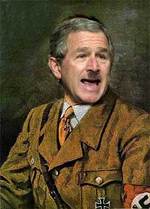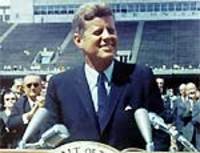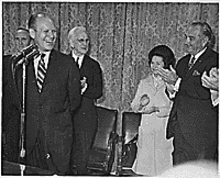Following is the essay you can designate as Volume 10, Number 47 of
This Week’s Clue, based on the e-mail newsletter I have produced since
March, 1997. It would be the issue of November 26.
Enjoy.

Evil sees itself as the only good.
This is the paradoxical nature of evil, everywhere and in every time.
Evil is good which thinks too much of itself.
Didn’t expect the Spanish Inquisition? Nobody does, because we are taught to see the faith of our fathers as an unalloyed good. It can be, but only if it tolerates other faiths and fathers, no matter how grudging that tolerance may be.
It was the intolerance of Communists that turned the workers’ paradise into the peoples’ hell in the 20th century, everywhere it was applied. It was blind, self-centered self-belief that twisted the South in the 19th century and was at the heart of Nazi Germany from its beginning, that lay in the weeds of both apartheid and the Mugabe dictatorship.
This is the essence of the evil we see in George W. Bush, in Dick Cheney, in all their followers. They see their own interests as the only possible good. They see all other interests as evil. The terrorists aren’t evil-doers. They’re good men who do evil because they see their own cause as the only good.
The test is as simple as that.
Islam is mere submission to God’s will, an unalloyed good. Once that submission is demanded by force it does evil. Judaism is the glorious word of God, but when others are oppressed in its name it does evil. I’ve got nothing against Mormons, but when they see only their own humanity and not that of the girls or women around them I call the cops. It was the intolerance of Hinduism which Gandhi most feared, and it is indeed that intolerance that has caused it to do evil, tearing down mosques, banning languages, all the rest.
This paradoxical nature of evil fools everyone.
Due to the nature of my ADHD, I can see this truth in the mirror, or when I look in the eyes of my son, which can be the same thing.
We have an oppositional disorder, which means we confuse our own interests with justice at the point of conflict. The kids were arguing on the couch yesterday, and John was starting to raise his voice. I told him, firmly, that he needed to lower it, at which point we exchanged a few screams and he threw a water spritzer against the wall, smashing it.
I want what I want. That’s the way I used to put it when I was just 8 years old. I want what I want. Words to live by, I thought. Words to kill by, I learned.
It’s probably because I’m always up against this paradox that I can see it, while most can’t. This is true personally, and historically. We live in our world, bound to our time, our place, and the beliefs we were raised on. It’s rare to look outside, see things as they are, and render objective judgment. That’s what juries are for, both in our system and in history. Yet with every turn of history’s wheel, it seems, a different judgment is rendered.
A few, the artists and sages, can see life from outside the box. But these are rare people, and their audiences are limited. It seems in the nature of our journalism that such thinking is forbidden. All TV "analysis" is bound by the myths and values of our time, the obsolete assumptions of the Nixon Era. And they drown out every other voice.
There’s a great scene in Broadcast News, Holly Hunter’s first big hit, where she’s told "it must be wonderful to be right all the time." "No," she replies. "It’s horrible." And it is. It does you no good to get on the Titanic, to be out at sea on the first day, and know the iceberg is coming. It does no good at all.
So what then is the sense of knowing the pattern? You can’t get out of the way. You can’t change a thing. What good is it to know this key Clue at all? What good is it to teach this Clue to your children, to burden them with it? What point is wisdom if folly is the unalterable rule?
Two men with dogs went into their backyards. One watched his step closely for signs of what his dog had left. The other stepped boldly where his feet led him. One came in with poop on his shoes, and one came in without it.
There are no guarantees in being careful, but that’s still the way to bet. There are no guarantees even in the better angels of our nature. They must be listened to carefully, skeptically.
A good idea can do far more good than a firm belief.













